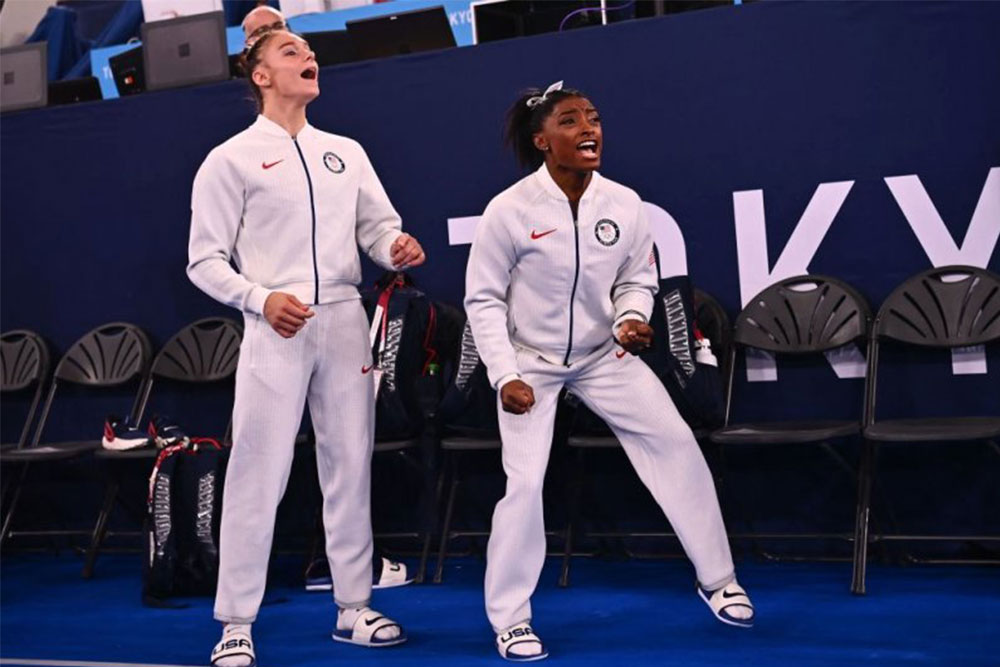American gymnast, Simone Biles, one of the most famous athletes at the Tokyo Olympics, withdrew from the women's team competition yesterday night after confessing she "freaked out in a high-stress situation”.
Biles then spoke powerfully, and honestly, about the mental health issues of top athletes in dramatic and unprecedented circumstances at the Ariake Gymnastics Centre, before confessing that she hoped that speaking out will have an even greater seismic effect than winning many gold medals.
The 24-year-old had been expected to go all-out for the record books in Japan, having qualified for six finals to be held over the next week, but she astonished everyone when she informed a trainer after just one vault, "I don't want to do it - I am done," and exited the arena.
The remaining three members of the US team were obliged to continue without her, but Biles returned to support her teammates, who took silver behind the Russian Olympic Committee and bronze behind Team GB. Biles later stated, however, that she had struggled with the demands of being one of the world's most famous athletes, the special strain of these Games, and the added challenge of being stuck in a COVID-19 secure bubble.
“I don’t trust myself as much as I used to,” she explained. “I don’t know if it’s age and I’m a little bit more nervous when I do gymnastics. I feel like I’m also not having as much fun. This Olympic Games I wanted it to be for myself, but I came in and I felt like I was still doing it for other people. It hurts my heart that doing what I love has been kind of taken away from me to please other people.”
She went on to say that her coaches were completely behind her decision. “They saw I was going through it and they totally agreed it was not worth getting hurt over something so silly, even though it’s so big – the Olympics Games,” she added. “But at the end of the day we want to walk out of here, not be dragged out of here on a stretcher.”
When asked what her Olympic aim was now, Biles simply replied: “To focus on my well-being.” She did not rule out a comeback to competing in Thursday's all-round final, stating, “There's a lot more to life than gymnastics.”

Biles, who has been seeing a therapist since former team doctor Larry Nassar's abuse of many US gymnasts became public, also revealed that the pressure of the final few days in Tokyo had begun to overwhelm her. “Therapy has helped a lot as well as medicine, and I feel like that’s all been going really well,” she said. “But whenever you get in a high stress situation you freak out and you don’t really know how to handle all of those emotions, especially being here at the Olympic Games.”
The American star suffered mightily in her debut appearance at these Olympics during Sunday's qualifying round, later admitting on Instagram that she felt like she was carrying "the weight of the world on my shoulders at times." It was widely expected, however, that she would put the incident behind her.
When Biles failed to do the vault she had planned – a Yurchenko with 21/2 twists – instead managing 11/2 twists and stumbled on the landing, it was evident that something was seriously wrong. Her 13.766 point score was one of her lowest in her career.
What's more astonishing is that the American has regularly revolutionised the art of the possible over the last few years with her inexplicable blend of elegance, strength, and physics-defying fearlessness. Biles made history earlier this year at the US Classic when she became the first female athlete to accomplish an extremely difficult Yurchenko double pike vault in a competition — and she was expected to do the same in Tokyo.
With her team cheering her on, Biles expressed her hope that talking about mental health, which has long been taboo in sports, would have a greater impact than winning gold. Biles stated, "We're not just athletes. At the end of the day, we are people, so we have to focus on that.”
She had equalled the women's gymnastics record of four gold medals in a single Games in Rio (2016), and she was a strong favourite to become the oldest woman to win the Olympic all-around crown in more than five decades. But none of that seemed to matter in the stillness of the Ariake Gymnastics Centre.
Biles told the press that the impact of Japanese tennis sensation Naomi Osaka, who withdrew from the French Open due to mental health concerns, had helped her speak openly. Osaka, who was the Japanese face of the Olympics and lighted the Olympic cauldron, was knocked out in the third round of the women's singles at the Olympics on Tuesday, admitting that pressure played a role. “She’s been a huge inspiration,” Biles stated. “A couple of days ago I watched her whole docu-series on Netflix and it really shined a light on it. It’s like, wow she’s one of the greatest athletes in the world and she took a step back and now look at her, she’s back here at the Olympics dominating. So sometimes it is OK to take a back seat – even at the most important meet.”